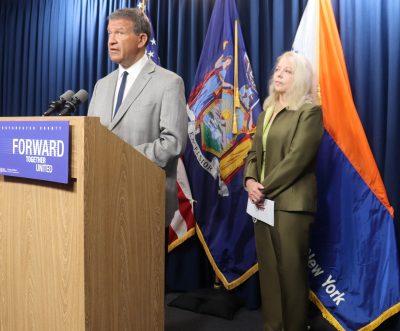County to Administer Monkeypox Vaccine to Exposed, At-Risk Residents

Westchester County started administering monkeypox vaccine to residents who are at risk for the virus or who have been exposed to the virus on Monday through the Department of Health in White Plains.
The vaccines will be available at the department’s clinic at 134 Court St. on Mondays from 12 to 3 p.m. and Wednesdays from 4 to 7 p.m. while supplies are available. A person must have an appointment to receive a vaccine by calling the Department of Health at 914-995-8900.
Officials are mobilizing in case monkeypox becomes a more serious health concern. Despite only 18 cases identified in the county as of Monday afternoon and the relative difficulty in transmitting the virus compared to COVID-19, there has been some heightened sensitivity because of the pandemic.
“I think the good news is that this is not COVID,” said county Health Commissioner Dr. Sherlita Amler said. “The general public does not need to be panicked. This is just different. It’s not airborne.”
County Executive George Latimer and Amler held a briefing last Friday morning in hopes of helping the public better understand monkeypox. As of Monday, there were more than 1,500 confirmed cases nationwide with no deaths associated with monkeypox. In New York State, there were 414 cases as of last Friday.
The virus has been identified in several other counties outside of New York City and Westchester. However, Westchester has the second most cases well behind the city.
“When we dealt with COVID, we dealt with an illness that did trigger fatalities,” Latimer said. “The second thing is all the cases in Westchester County are individuals, while having tested positive for monkeypox, are recovering, and so we believe that those who are identified today as having the disease will recover. It is a painful disease but it is not necessarily a fatal disease.”
Initially, New York State had received 8,195 doses of the monkeypox vaccine from the federal government. Westchester County had obtained 450 doses from the state, with 100 each going to Westchester Medical Center, Open Door Family Medical Centers and St. John’s Riverside Hospital in Yonkers. Another 90 doses were earmarked for Mount Vernon and New Rochelle with 10 doses going to White Plains Hospital and 50 for the county Department of Health.
The county has received another 520 doses from the state and will administer vaccinations twice a week.
Amler said those exposed and the immunocompromised are eligible for the vaccine. The vaccine requires a two-dose regimen administered 28 days apart.
However, unlike COVID-19, Amler said monkeypox is spread through skin-to-skin contact with a person who has symptoms. Symptoms include a rash, typically on the face, the palms of the hand, the soles of the feet, in the mouth or around the genitals, swelling of the lymph nodes and bad headaches. A fever is sometimes associated with monkeypox as well, she said.
Symptoms usually last for two to four weeks, but unless a person is exhibiting symptoms, they do not have monkeypox, Amler said. It also cannot be transmitted by simply being in the same room with a person who has tested positive unless they come in contact with a lesion from a rash or touch an item that has fluid from a lesion as a result of the rash, Amler said. Therefore, there is no reason to wear a mask to guard against monkeypox.
The county does not know the municipalities of residence for the 18 infected people. However, since it is not an airborne illness, it is not critical to have that information, Latimer said.
Amler said that if a vaccine is administered within four to 14 days of exposure that can help limit or prevent the symptoms.
“We should not be alarmed but we should stay informed about monkeypox,” Amler said. “This means understanding the symptoms, how it spreads and what to do if you’re exposed. I think just being knowledgeable is the most important thing any of us can do at this point.”

Martin has more than 30 years experience covering local news in Westchester and Putnam counties, including a frequent focus on zoning and planning issues. He has been editor-in-chief of The Examiner since its inception in 2007. Read more from Martin’s editor-author bio here. Read Martin’s archived work here: https://www.theexaminernews.com/author/martin-wilbur2007/
